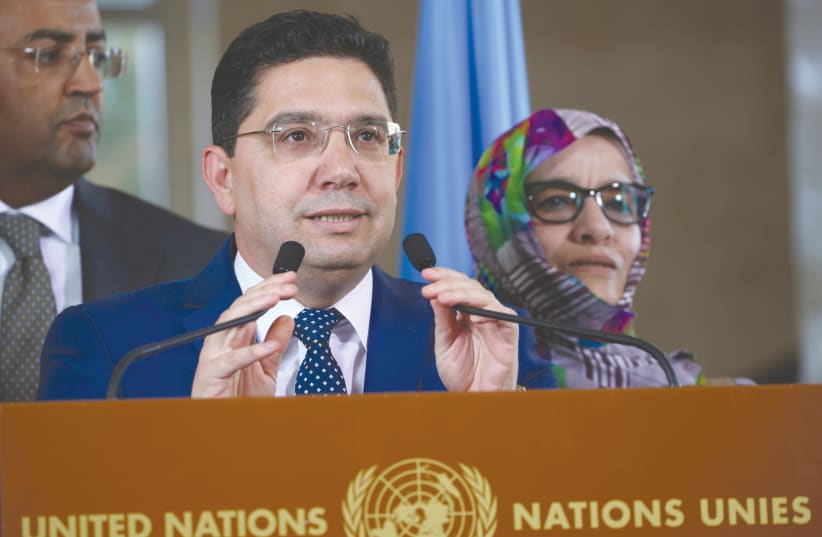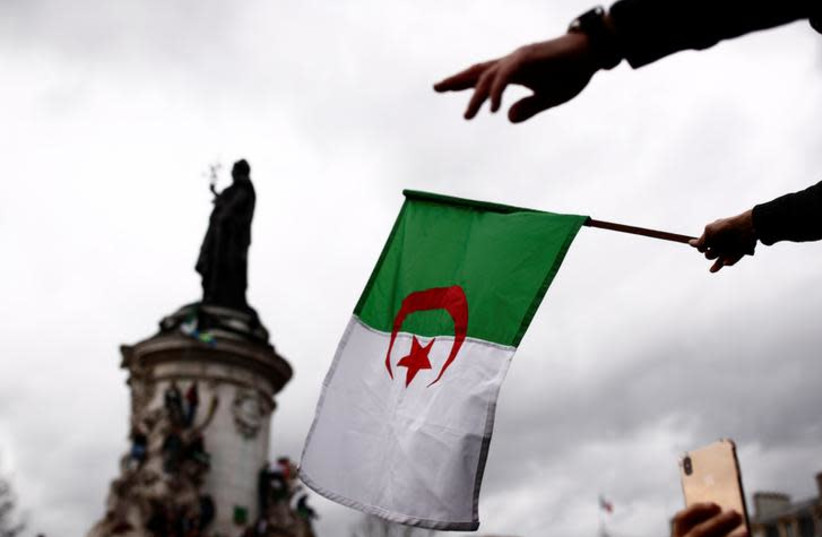To understand the political significance of the new UN resolution on the Sahara conflict, it should be analyzed in light of the regional context in which it was adopted: unprecedented tension between Morocco and Algeria.
Strategic-political differences and media conflict have long stamped relations between these two Maghreb neighbors for at least four decades. However, hostility has reached a decisive and more worrisome turn in recent months, culminating in Algeria’s severance of all relations – diplomatic, commercial, etc. – with Morocco.
Not content with this sudden diplomatic rupture, the barrage of unproven accusations, ad hominem attacks and virulent statements it has thrown at the eternal “Moroccan enemy,” Algeria recently went as far as to issue an equally outrageous statement to the UN.
Indeed, barely a day after the adoption of Resolution 2602 by the UN Security Council, Algiers, already fuming, warned the council against any continuation of the UN’s Western Sahara political process within the parameters the organization has adopted since 2007.
It is no secret that the events in
on November 13, 2020, when Moroccan security forces dislodged a group of Polisario militiamen who had blocked the road between southern Morocco and northern Morocco, as well as the American acknowledgment of Moroccan sovereignty, have considerably shifted the regional power balance in Morocco’s favor.
For the past 12 months, Polisario and Algeria have worked tirelessly to incite a regional conflict in Western Sahara and compel the UN Security Council to intervene. They have issued a slew of press releases alleging a “raging war” and implying that the situation could worsen if the UN fails to meet its pledge to allow Sahrawis to exercise their right to self-determination through a referendum.
All of these gesticulations and aggressive speech from Algeria and the Polisario Front aimed to achieve three goals:
First, they wanted to persuade the Security Council to discuss the November 13 events and have Morocco return to the pre-November 13 status quo. In other words, Algeria was determined to preempt or openly oppose the Security Council’s tacit approval of Moroccan sovereignty over Guerguerat at any cost.
Their second objective was to get the Security Council to reconsider its position on the preponderance or the centrality of a realistic political, and compromise-based solution to the Sahara conflict. They wanted the Security Council to reintroduce a revision of the mandate of the United Nations Mission for the Referendum in Western Sahara (MINURSO), such as having the referendum option reinstated and not mentioning Algeria as an integral party to the conflict.
Third, instead of a one-year mandate, they aspired to reduce the duration of MINURSO’s mandate to six months, as it was between 2017 and 2018. For Algeria and the Polisario Front, such a change would increase pressure on Morocco and compel it to make concessions that would allow them to make up for the diplomatic setbacks they have suffered in recent months.
In other words, in a context that has been marked by repeated diplomatic victories for Morocco, Algiers wishes to put Rabat on the defensive.
However, much to the displeasure of Algeria, the Security Council does not appear to have been moved by Algeria’s protestations and outbursts. Indeed, the fact that Guerguerat is not mentioned at all in the latest UNSC resolution on the Sahara conflict adds to Morocco’s recent diplomatic breakthroughs.
For one thing, the tone of the new resolution suggests that the Security Council is settled on the Guerguerat matter, and that this area, which was previously part of the buffer zones, is now effectively under Morocco’s control.
To put it bluntly, Resolution 2602 is a new slap in the face for Algeria. Because, in addition to settling the Guerguerat issue, the resolution makes it abundantly clear that political realism and compromise – curiously the Moroccan position since the much-applauded 2007 Autonomy Plan – is the only way to settle the territorial dispute.
Furthermore, the Security Council, as mentioned in its previous resolutions, maintains the round tables-based negotiation framework established in December 2018 and considers Algeria as a full-fledged participant in the conflict rather than just an observer. This is a significant political step since the UNSC is explicitly saying that Algeria should take part in the Geneva talks with Morocco, Mauritania and Polisario.
Morocco’s solid position is also reflected in the tone of the UNSC, which has been in place for more than two years. The North African kingdom has repeatedly urged the UN to recognize Algeria’s leading role in the Sahara conflict, as well as its responsibility in finding a political solution that preserves regional stability.
Another important component of the new resolution is its call on conflicting parties to embrace pragmatism and political realism as the most viable – and only – way out of the decades-long diplomatic stagnation. Resolution 2602 thus represents a continuation of the paradigm shift that has been taking place in UN diplomacy on the Sahara issue for the past 15 years: the acknowledgment of the impossibility – or even delusion – of a referendum on self-determination.
More specifically still, since the adoption of Resolution 2414 in April 2018, the UNSC has emphasized that only through compromise and realism-based political negotiations can the Sahara conflict be brought to an end. The term “compromise” was mentioned three times in that resolution, four times in Resolution 2440, and five times in resolutions 2468, 2494, 2548 and 2602, respectively.
To gauge the political significance of the UN’s tone on the Sahara question, the current resolution must be compared to previous ones, particularly those adopted between April 2007 and April 2017. With the exception of resolutions 1754 and 1783, which do not use the term “compromise,” each of the other resolutions stressed the need for the parties to be guided by a spirit of compromise just once.
The same can be said of the term “realism.” Nowhere does the term “realism” appear in resolutions 1754 and 1783 adopted in April 2007, while it was mentioned only once in each of the resolutions adopted between April 2008 and October 2018.
The adoption of Resolution 2440, which stresses the need for realism twice, initiated a dramatic shift away from self-determination toward a compromise-based and realistic political solution. The “realism” principle has been cited three times in every UN resolution on the Sahara conflict since the adoption of Resolution 2464, including Resolution 2602.
This is especially an important aspect for any honest analysis of the Sahara conflict, given the importance of each word – verb, adverb or adjective – in Security Council or other UN bodies resolutions, and the fact that member state delegations sometimes spend an entire day debating the choice of this or that word.
By emphasizing the necessity of “compromise-based” negotiations to find a “practical” political solution to the Sahara conflict, the UNSC has once again rejected Algeria’s and the Polisario’s pleas to organize a referendum of self-determination.
All of the resolutions adopted since 2007 have shown that a solution to the issue should not produce victors and vanquished. It should rather be founded on compromise and political realism and driven by a genuine willingness to end the tragedy of thousands of Sahrawi families and avoid more regional instability.
However, as the main provider of financial, strategic and logistical support to the Polisario Front for more than four decades, Algeria considers any solution other than the establishment of an independent state in southern Morocco as an unacceptable defeat.
The writer is a Washington-based political analyst. He is an expert on Morocco’s foreign policy, as well as in MENA politics. He is the author of two books on the relations between Morocco and Spain, published in French. He is preparing a book about the Sahara in English to be published next spring. He is the co-founder of Morocco World News.

